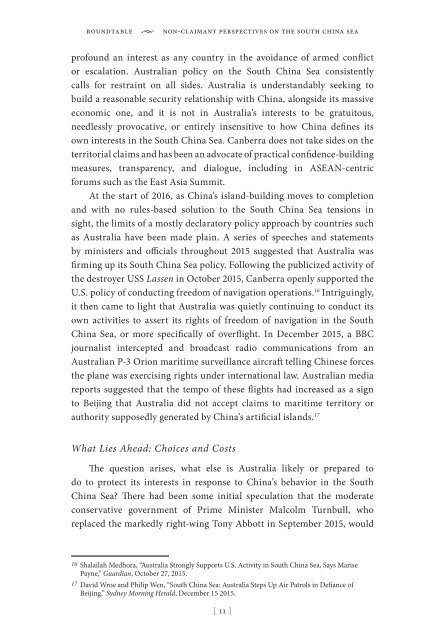You also want an ePaper? Increase the reach of your titles
YUMPU automatically turns print PDFs into web optimized ePapers that Google loves.
oundtable • non-claimant perspectives on the south china sea<br />
profound an interest as any country in the avoidance of armed conflict<br />
or escalation. Australian policy on the South China Sea consistently<br />
calls for restraint on all sides. Australia is understandably seeking to<br />
build a reasonable security relationship with China, alongside its massive<br />
economic one, and it is not in Australia’s interests to be gratuitous,<br />
needlessly provocative, or entirely insensitive to how China defines its<br />
own interests in the South China Sea. Canberra does not take sides on the<br />
territorial claims and has been an advocate of practical confidence-building<br />
measures, transparency, and dialogue, including in ASEAN-centric<br />
forums such as the East Asia Summit.<br />
At the start of 2016, as China’s island-building moves to completion<br />
and with no rules-based solution to the South China Sea tensions in<br />
sight, the limits of a mostly declaratory policy approach by countries such<br />
as Australia have been made plain. A series of speeches and statements<br />
by ministers and officials throughout 2015 suggested that Australia was<br />
firming up its South China Sea policy. Following the publicized activity of<br />
the destroyer USS Lassen in October 2015, Canberra openly supported the<br />
U.S. policy of conducting freedom of navigation operations. 16 Intriguingly,<br />
it then came to light that Australia was quietly continuing to conduct its<br />
own activities to assert its rights of freedom of navigation in the South<br />
China Sea, or more specifically of overflight. In December 2015, a BBC<br />
journalist intercepted and broadcast radio communications from an<br />
Australian P-3 Orion maritime surveillance aircraft telling Chinese forces<br />
the plane was exercising rights under international law. Australian media<br />
reports suggested that the tempo of these flights had increased as a sign<br />
to Beijing that Australia did not accept claims to maritime territory or<br />
authority supposedly generated by China’s artificial islands. 17<br />
What Lies Ahead: Choices and Costs<br />
The question arises, what else is Australia likely or prepared to<br />
do to protect its interests in response to China’s behavior in the South<br />
China Sea? There had been some initial speculation that the moderate<br />
conservative government of Prime Minister Malcolm Turnbull, who<br />
replaced the markedly right-wing Tony Abbott in September 2015, would<br />
16 Shalailah Medhora, “Australia Strongly Supports U.S. Activity in South China Sea, Says Marise<br />
Payne,” Guardian, October 27, 2015.<br />
17 David Wroe and Philip Wen, “South China Sea: Australia Steps Up Air Patrols in Defiance of<br />
Beijing,” Sydney Morning Herald, December 15 2015.<br />
[ 11 ]


